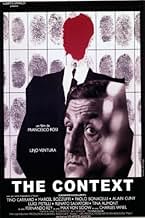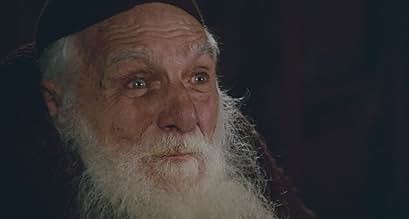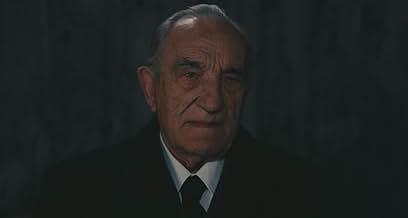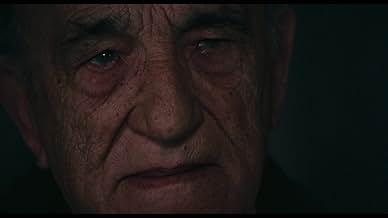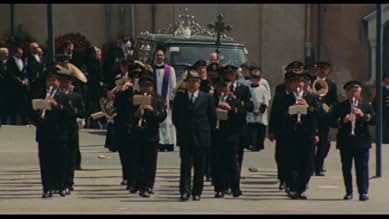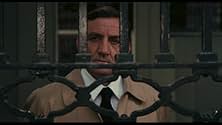VALUTAZIONE IMDb
7,3/10
3002
LA TUA VALUTAZIONE
Un detective viene incaricato d'indagare sui misteriosi omicidi di alcuni giudici della Corte Suprema. Durante le indagini scopre un complotto che coinvolge il Partito Comunista Italiano.Un detective viene incaricato d'indagare sui misteriosi omicidi di alcuni giudici della Corte Suprema. Durante le indagini scopre un complotto che coinvolge il Partito Comunista Italiano.Un detective viene incaricato d'indagare sui misteriosi omicidi di alcuni giudici della Corte Suprema. Durante le indagini scopre un complotto che coinvolge il Partito Comunista Italiano.
- Regia
- Sceneggiatura
- Star
- Premi
- 5 vittorie e 6 candidature totali
Recensioni in evidenza
This is a remarkable film which captures perfectly the greyness, cynicism and violence of the Italian political scene in the 70s and 80s, the 'years of lead' as Italians call them (anni di piombo). The highly script, acting and direction are all top notch and the twists and turns keep you glued to the screen. It really deserves to be better known. The ending is extraordinarily downbeat! No Hollywood feelgood in this one.
Near perfect political thriller, with a perfectly cast Lino Ventura in the leading role. Supporting roles, cinematography, direction and score, it's all very close to perfection. This film has this unique dark, typical European 70's-movie atmosphere, of which these French-Italian productions seem to have the copyright.
A big 8.
A big 8.
Grab your chins and prepare to do some stroking because we are in serious territory here with Francesco Rosi's Illustrious Corpses.
No jaw-socking, car chases and even gunfights here, but don't run off to Maurizio Merli yet. What we have here is a nice, thick Spezzatino full of meat (plot), vegetables (twists), and herbs (cameo appearances by various Italian genre actors), all mainly revolving around middle-aged policeman Rogas.
The general tone of the film is set when we see an elderly judge wandering through the Catacombe dei Cappuccini, looking at the corpses and perhaps considering his own mortality. That would be ironic because about a minute after he leaves someone unknown assassin shoots him.
This brings us to Rogas, Italy's best detective, brought in because killing judges isn't generally approved. At first Rogas brings in the local mob, but as one Don states: "You know you are wasting your time with us." While he's doing that another judge is killed on a highway, and yet another while Rogas is in the same building. This piles significant pressure on Rogas as the situation becomes, as one person puts it 'political'.
Rogas reckons he's nailed the case when he starts digging into trials involving all three judges, which leads to him finding a suspect for whom every image has been destroyed, including photo albums and even police documentation. This leads the film into giallo territory for a brief time as we see another judge get stalked and murdered, while Rogas is pushed to look at subversive groups and bag a quick arrest by his superiors.
This two hour long film that has very little action should be snooze-fest, but it is relentlessly fascinating to watch Rogas weave his way through the political labyrinth of Italy's Years of Lead, speaking with bemused, yet sinister Senators like Fernando Rey (great here), angry, unrepentent judges like Max Von Sydow (also great), and the Communist party (including journalist Luigi Pistilli). You also get cameos from Marcel Bozuffi and Tina Aumont thrown in for good measure.
What also keeps you watching is the ever growing sense of doom and paranoia that begins to surround Rogas as he loses confidence and trust in every single person he deals with, leaving him constantly looking over his shoulder. There's a scene where he realises his telephone is bugged that's as foreboding as any horror film.
I highly recommend this one - it's dark and complex. Like a Spezzatino.
No jaw-socking, car chases and even gunfights here, but don't run off to Maurizio Merli yet. What we have here is a nice, thick Spezzatino full of meat (plot), vegetables (twists), and herbs (cameo appearances by various Italian genre actors), all mainly revolving around middle-aged policeman Rogas.
The general tone of the film is set when we see an elderly judge wandering through the Catacombe dei Cappuccini, looking at the corpses and perhaps considering his own mortality. That would be ironic because about a minute after he leaves someone unknown assassin shoots him.
This brings us to Rogas, Italy's best detective, brought in because killing judges isn't generally approved. At first Rogas brings in the local mob, but as one Don states: "You know you are wasting your time with us." While he's doing that another judge is killed on a highway, and yet another while Rogas is in the same building. This piles significant pressure on Rogas as the situation becomes, as one person puts it 'political'.
Rogas reckons he's nailed the case when he starts digging into trials involving all three judges, which leads to him finding a suspect for whom every image has been destroyed, including photo albums and even police documentation. This leads the film into giallo territory for a brief time as we see another judge get stalked and murdered, while Rogas is pushed to look at subversive groups and bag a quick arrest by his superiors.
This two hour long film that has very little action should be snooze-fest, but it is relentlessly fascinating to watch Rogas weave his way through the political labyrinth of Italy's Years of Lead, speaking with bemused, yet sinister Senators like Fernando Rey (great here), angry, unrepentent judges like Max Von Sydow (also great), and the Communist party (including journalist Luigi Pistilli). You also get cameos from Marcel Bozuffi and Tina Aumont thrown in for good measure.
What also keeps you watching is the ever growing sense of doom and paranoia that begins to surround Rogas as he loses confidence and trust in every single person he deals with, leaving him constantly looking over his shoulder. There's a scene where he realises his telephone is bugged that's as foreboding as any horror film.
I highly recommend this one - it's dark and complex. Like a Spezzatino.
Director Francesco Rosi calls ILLUSTRIOUS CORPSES "a trip through the monsters and monstrosities of power." It is a detective thriller with the format of a political expose and deals with an unseen killer whose victims are judges, public prosecutors and magistrates. Viewers who have seen Rosi's THREE BROTHERS remember that one of the episodes in that film deals with a magistrate has a nightmare in which he envisions his own murder my terrorists. In ILLUSTRIOUS CORPSES Rosi elevates the crime of assassination to a cataclysmic dimension within which a modern industrial society is dragged to the brink of collapse. It is a structurally elliptical but harrowing picture of the weaknesses in social foundations and the fragility of all government. The country the movie is set in is unspecified although it clearly seems to be Italy. Yet the film is unspecific enough to represent any nation portrayed as being on the brink of anarchy. The eerie opening is set in Palermo's Convento dei Cappuccini with its crypt of 8000 bodies, some mummified, some rotting in subterranean corridors. Rosi turns those images into a horrific metaphor of political and social transience that are the themes of this movie. In the final sequence, oceans of banner-waving Communists are cut with noisily revving tanks being readied for a rightist takeover of power. One should observe that Rosi's left-wing political biases admit only of right-wing coups as being ominous. Nevertheless, it is an unsettling finale to a remarkable and unsettling film.
"Cadaveri Eccelenti" is an intelligent thriller which incites viewers to find out the truth about the motives behind some senseless killings.It does not give easy clues to viewers to ascertain the identity of the killer.This is why viewers are somewhat forced to guess till the very end about the real identity of the killer.Francesco Rosi has shot "Cadaveri Eccelenti" in a very formal manner in which it is hard to tell whether some influential people are behind the political killings or are they the brainchild of a lunatic who is determined to take revenge on judges who punished him for no fault ? The political milieu depicted in the film appears to be true as well as close to reality as one watches with interest how phones are tapped,conversations of key persons recorded and influential politicians rub shoulders with their business associates.The saddest thing about the film is its depiction of how an honest police man is defeated.It forms an integral part of a surprising end which might be a little disappointing for some. However,it can be accepted solely for being highly unpredictable.
Lo sapevi?
- QuizThe title refers to a party game, Cadavres Exquis (Exquisite Corpses) invented by the French Surrealists. Each person in turn would be handed a piece of paper folded accordion fashion so that only one narrow horizontal strip showed at a time. The person would draw a section of a human body but would not know what other people had previously drawn. At the end the paper would be unfolded to show the entire body, which would be a mixture of fat and thin, young and old, male and female, etc. The title therefore means that one is not able to use what happens as any guide to what will happen next.
- ConnessioniEdited into Lo schermo a tre punte (1995)
I più visti
Accedi per valutare e creare un elenco di titoli salvati per ottenere consigli personalizzati
- How long is Illustrious Corpses?Powered by Alexa
Dettagli
- Data di uscita
- Paesi di origine
- Lingua
- Celebre anche come
- Illustrious Corpses
- Luoghi delle riprese
- Agrigento, Sicily, Italia(Judge's body laid on the road: 37.3052°N, 13.5751°E)
- Aziende produttrici
- Vedi altri crediti dell’azienda su IMDbPro
Contribuisci a questa pagina
Suggerisci una modifica o aggiungi i contenuti mancanti

